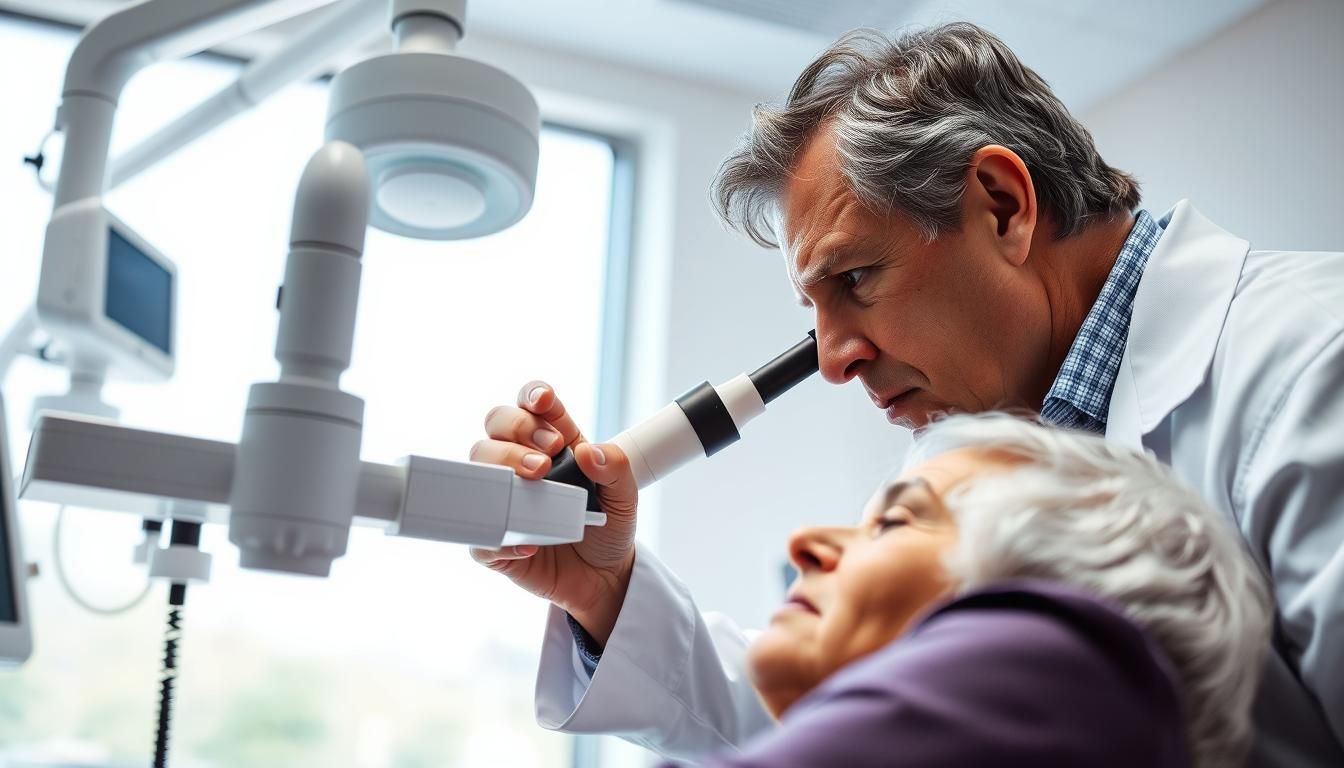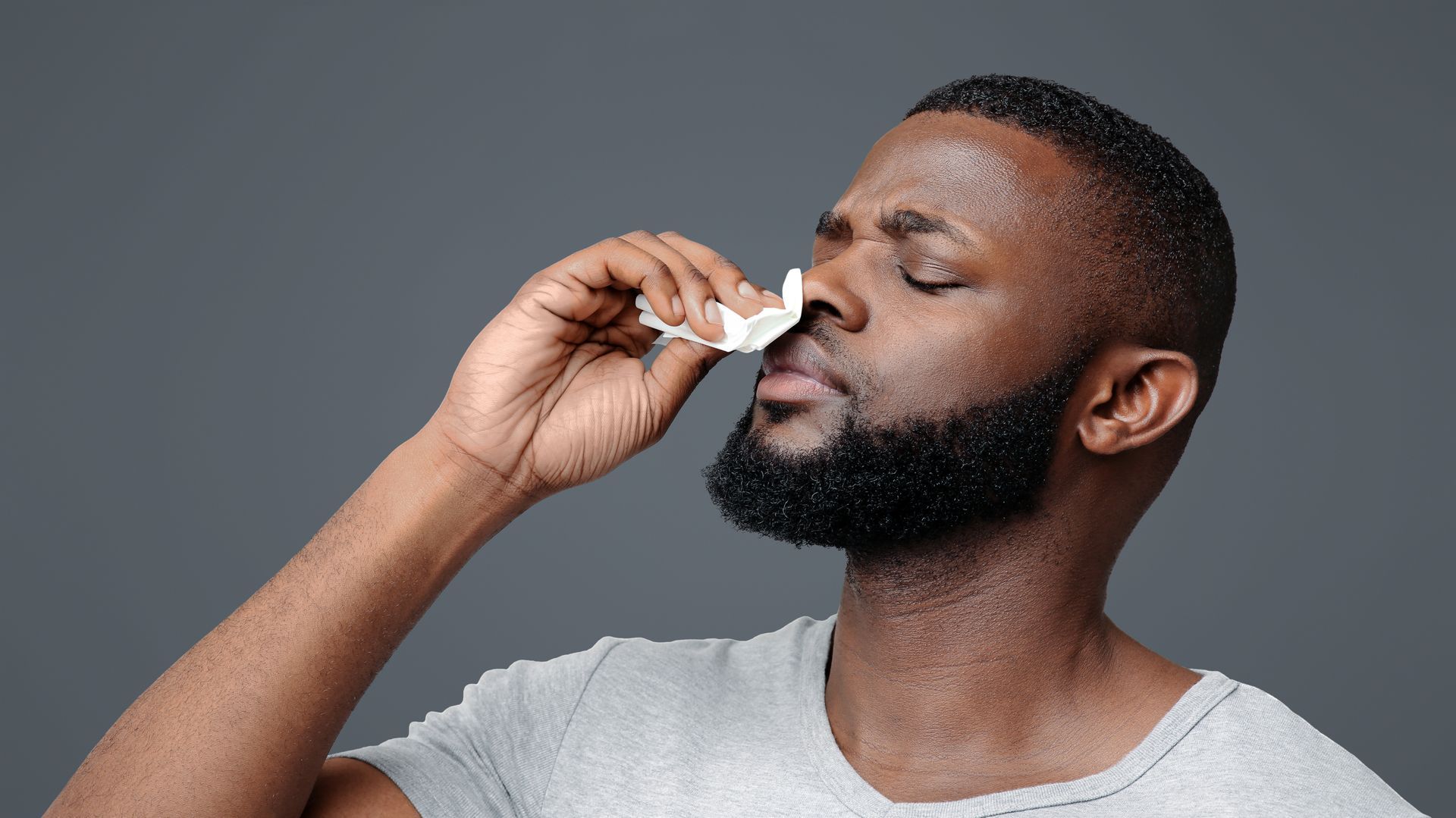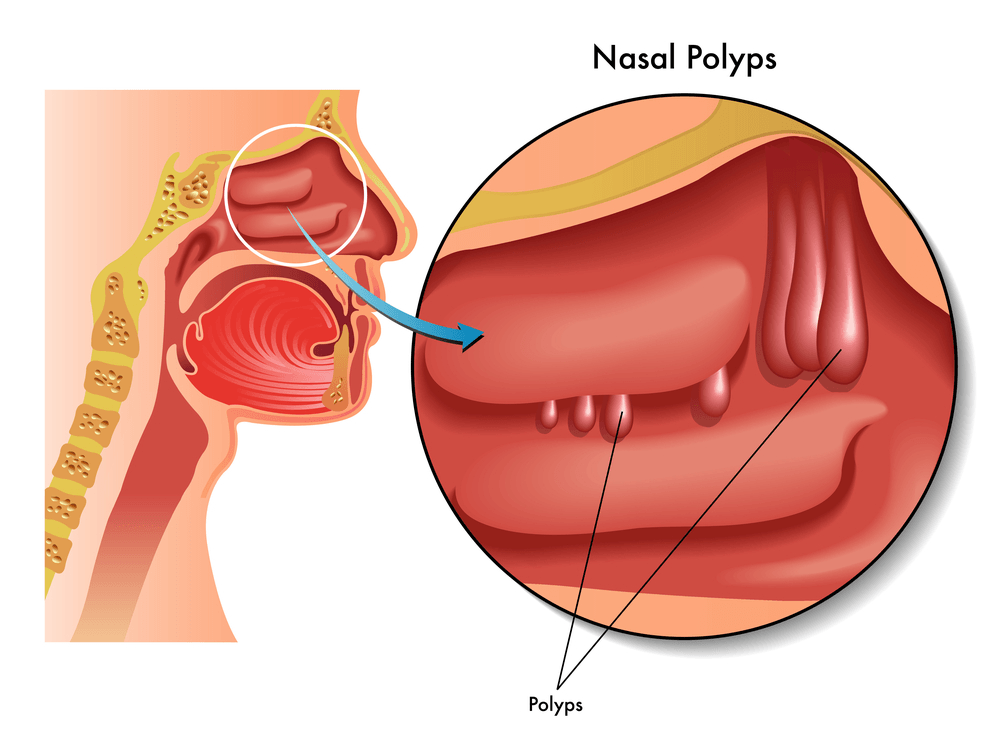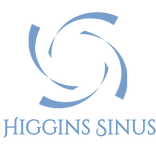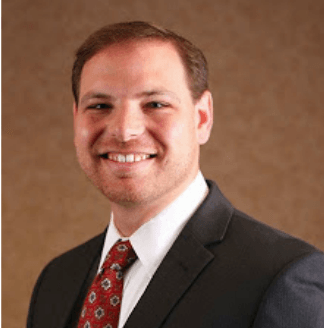By Thomas Higgins
•
June 30, 2025
Ever wake up with pressure behind your eyes and struggle to breathe? Wondering if it will ever stop? Chronic nasal issues can make everyday tasks hard. Many people wait months for symptoms to go away. Others use over-the-counter meds for quick fixes. The truth is, persistent problems often signal the need for specialized care. Knowing when to see a sinus specialist can change your life. These health issues can mess with your sleep, work, and life quality. This guide will help you spot warning signs for expert treatment. We'll show you when your symptoms need more than primary care. This empowers you to make smart health choices. Key Takeaways Persistent symptoms lasting more than 12 weeks may require specialized evaluation Recurring infections or severe headaches often indicate the need for expert care A sinus specialist offers advanced diagnostic tools and treatment options Early intervention can prevent complications and improve long-term outcomes Specialized care addresses root causes rather than just managing symptoms Professional evaluation helps distinguish between different types of nasal conditions Understanding When Your Sinus Problems Need Expert Care Figuring out when to see a specialist for sinus issues can be tricky. Sometimes, you might just have a cold or minor sinus infection that goes away on its own. But, knowing when it's time to get help can prevent a lot of pain. It's all about patterns and persistence . If your sinus troubles last more than a couple of weeks, or if they keep coming back, it's time to see a doctor. This is true even if you've tried over-the-counter meds. Many people think of chronic sinus issues as just allergies or something they have to live with. But, this thinking can lead to more suffering and health problems. Your quality of life is important, and constant nasal congestion shouldn't be normal. Think about how your sinus problems affect your daily life. Do you always need tissues? Do you have trouble breathing? Do you avoid social events because of your sinuses? If so, it's a sign you need expert help. Spotting these patterns early can stop problems from getting worse. Many people wait too long to see a specialist, letting their sinus issues get more serious. How often you get sinus problems matters a lot. If it happens more than four times a year, or if each episode lasts longer, you need to see a doctor. Remember : You don't have to deal with chronic sinus problems alone. A specialist can find the cause of your nasal congestion and offer treatments that general meds can't. Getting help early can lead to better results and faster relief. What Does a Sinus Specialist Do That Your Regular Doctor Cannot? Sinus specialists have special skills and tools that change how we tackle tough nasal problems. While your family doctor is great for general care, sinus issues need more advanced knowledge and tools. These go beyond what's usual in regular medicine. The big difference is in the training and technology sinus specialists use every day. They offer solutions that work when other treatments don't. ENT Doctor Specialized Training and Expertise An ent doctor has extra years of training after medical school. This is all about ear, nose, and throat issues. They learn a lot about sinus anatomy, surgery, and treatment plans. Most ent doctors spend five years in a residency program for otolaryngology. They do many procedures and get a lot of experience with rare conditions. Thanks to their deep knowledge, sinus specialists can spot early warning signs. They know how sinus health ties into the rest of the body. This lets them tackle the real causes, not just symptoms. The specialized training we receive allows us to see patterns and connections that aren't immediately obvious to general practitioners. Advanced Diagnostic Equipment and Procedures Sinus specialists use tools that give detailed views of your sinuses. These tools help find problems that regular exams miss. Key diagnostic advantages include: Nasal endoscopy for direct visualization of sinus passages High-resolution CT scans that reveal structural abnormalities Specialized allergy testing for comprehensive treatment planning Advanced imaging techniques that map sinus drainage patterns These advanced tests let specialists make detailed plans for your treatment. They can spot issues like nasal polyps or blockages that need special care. With their training and tools, sinus specialists can offer treatments not found in regular care. This includes surgery and allergy programs that can really improve your life. Common Sinus Conditions That Require Specialist Care Many patients need advanced care for their sinus conditions. These complex issues often involve several factors. They require specialized diagnostic skills and treatment approaches. Primary care doctors handle many health issues well. But, some sinus problems need the expertise of ENT specialists. These include structural abnormalities, persistent infections, or complex causes. Chronic Sinusitis and Recurring Infections Chronic sinusitis is a tough condition to treat. It involves inflammation lasting 12 weeks or more, despite standard treatments. Unlike acute sinusitis, chronic sinusitis causes ongoing symptoms that affect daily life. Patients often face recurring infections every few months. This creates a cycle of temporary relief followed by symptoms again. The underlying causes often include bacterial biofilms, fungal elements, or immune system responses that general practitioners may struggle to identify and treat effectively. Chronic sinusitis needs a thorough evaluation to find the root causes. Our specialists use advanced tools to identify specific bacteria, assess immune function, and evaluate structural factors contributing to persistent inflammation. Nasal Polyps and Structural Abnormalities Nasal polyps are soft, painless growths in the nasal passages and sinuses. They can block airflow and trap mucus, leading to recurring infections and breathing difficulties. Polyps often indicate underlying inflammation that requires specialized management. Structural abnormalities in the nasal passages create ongoing problems. These issues often develop over time or result from previous injuries. We evaluate each patient's unique anatomy to develop targeted treatment plans. Many patients don't realize that structural problems contribute to their symptoms. Proper diagnosis requires specialized imaging and examination techniques that help us identify specific abnormalities affecting sinus function. Deviated Septum and Breathing Issues A deviated septum occurs when the wall between nasal passages shifts to one side. This common condition can cause severe breathing difficulties. Many people live with these symptoms unnecessarily , not realizing effective treatments are available. Breathing issues from septum problems often worsen over time. We evaluate how structural problems affect airflow and sinus drainage. This assessment helps us recommend appropriate treatment options, from conservative management to surgical correction. These conditions don't have to be permanent sources of discomfort. With proper specialist care, we can provide effective treatment options. These options offer lasting relief and dramatically improve your quality of life. Early specialist intervention often prevents complications and reduces the need for more extensive treatments later. 7 Warning Signs You Need to See a Sinus Specialist We've found seven key signs that mean you need to see a sinus specialist . These symptoms often start slowly but show your body needs more help than usual treatments can offer. Many people wait too long to see a specialist. They try many over-the-counter remedies and basic prescriptions for months. Seeing a specialist early can stop your condition from getting worse and help you find relief faster. Chronic Nasal Congestion Lasting More Than 12 Weeks Nasal congestion that lasts over three months is not just a temporary problem. It shows there's inflammation or structural issues that need expert care. Patients often try many decongestants and home remedies without success. This constant congestion can hurt your sleep, focus, and daily life . A sinus specialist can find the cause and create a treatment plan. Long-term congestion might mean problems like nasal polyps, chronic sinusitis, or structural issues that doctors can't fully diagnose or treat. Recurring Sinus Infections Every Few Months Having a sinus infection more than three times a year means there's a bigger problem. Antibiotics might help for a while, but they don't fix the real issue. We often see people stuck in this cycle. Each infection messes up their work, family life, and health. Recurring infections often come from structural issues, chronic inflammation, or immune system problems that need a specialist's help. A sinus specialist can end this cycle by finding out why infections keep coming back. They'll create a plan to stop future infections, not just treat symptoms. Severe Facial Pain and Pressure That Medication Cannot Relieve Severe facial pain and pressure that doesn't go away with pain relievers means serious sinus problems. This pain often gets worse when you bend forward or lie down. This pain can really hurt your work, sleep, and daily life . Even prescription pain meds might not help much. We know how tough this constant pain is. Severe, medicine-resistant pain often means deep sinus inflammation, structural issues, or complications that need advanced care. Complete Loss of Smell or Taste for Extended Periods Not being able to smell or taste for weeks or months is very concerning. It shows serious inflammation or structural problems in your nasal passages. Losing your sense of smell or taste affects more than just your food enjoyment. It can also make you less safe by not being able to smell gas leaks, smoke, or spoiled food . Many people also feel emotionally down because of this. We treat this symptom quickly because long-term loss can be permanent. Specialized treatment can often bring back these important senses if done soon enough. Other warning signs include thick nasal discharge, severe headaches that get worse when bending forward, unexplained upper tooth pain, and chronic fatigue from poor sleep. When you have many symptoms together, it's clear you need specialist care . How a Sinus Specialist Diagnosis Differs from Primary Care We offer detailed exams that go beyond what your family doctor can do. While your doctor might use basic tools, we use advanced tech to see inside your sinuses. Our process starts with nasal endoscopy . This lets us see into your nasal passages. It shows issues like deviated septum , polyps, or inflammation that regular doctors can't see. We also use CT scans to get detailed images of your sinuses. These scans reveal structural problems and blockages. Most primary care offices don't have this technology. The main difference is depth. We find the cause of your sinus problems, not just treat symptoms. Comprehensive allergy testing is another tool we use. Many sinus problems come from allergies that regular doctors might miss. We test for specific allergens that could be causing your symptoms. Here's how our approach compares to primary care: We take time to understand your medical history and symptoms. This helps us create treatment plans that really work for you. Our training lets us spot signs that general doctors might miss. We know how sinus conditions and lifestyle factors affect your symptoms. This leads to a precise diagnosis and effective treatment. We target the exact problem, not just manage symptoms. Advanced Treatment Options Only Specialists Can Provide When standard treatments don't work, specialized sinus care offers advanced solutions. We have innovative procedures and programs that tackle the root of your sinus issues. These specialized treatment options are only available from trained sinus specialists. They have the skills and tools for the best results. Our advanced care combines the latest technology with personalized plans. We choose each treatment based on your condition, symptoms, and lifestyle. This ensures you get the most effective treatment for lasting relief. Endoscopic Sinus Surgery for Severe Cases Endoscopic sinus surgery is a breakthrough for severe chronic sinusitis. It uses a thin, flexible tube with a camera for a minimally invasive approach. We can remove blockages and correct structural issues without harming healthy tissue. This sinus surgery offers faster recovery and less scarring than traditional methods. Most patients can return to normal activities within a week. The precision of endoscopic techniques targets problem areas while preserving healthy tissue. Balloon Sinuplasty for Less Invasive Relief Balloon sinuplasty is a great option for those seeking less invasive treatments. It gently opens blocked sinus pathways with a small balloon catheter. We insert the balloon, inflate it to widen the passage, and then remove it to restore drainage. This gentle sinus surgery option doesn't require cutting or tissue removal. Recovery is faster than traditional surgery, with most patients feeling relief within days. The procedure can often be done in our office under local anesthesia, making it convenient and comfortable. Comprehensive Allergy Treatment Programs Our allergy treatment programs target the underlying triggers of chronic sinus problems. We do thorough allergy testing to find specific environmental allergens affecting your sinuses. Based on these results, we create targeted treatment plans that may include immunotherapy options. Immunotherapy builds your tolerance to specific allergens over time. This treatment reduces the frequency and severity of sinus flare-ups caused by environmental triggers. We also teach you how to minimize allergen exposure in your daily life. Customized Medication and Therapy Plans We create personalized medication regimens using treatments not available to general practitioners. These may include specialized nasal sprays , targeted antibiotics, and advanced anti-inflammatory medications. Our approach considers your medical history, symptoms, and treatment preferences. We also offer additional therapies to complement our medication plans. We guide you on advanced saline irrigation systems and breathing exercises. Our recommendations help create optimal conditions for sinus health in your home and workplace. Our comprehensive treatment approach ensures you get the best care for your condition. We work closely with you to monitor progress and adjust treatments as needed. This personalized attention helps achieve the best outcomes for your sinus health and quality of life. What to Expect During Your Sinus Specialist Consultation Your first visit to a sinus specialist is a big step toward relief. We know medical visits can be tough, but we aim to make it easy and helpful. Our goal is to make you feel comfortable and well-informed. The visit usually lasts about 45 minutes to an hour. This time lets us really get to know your situation and plan a good treatment. It's a good idea to bring your questions and any past medical records about your sinus issues. Detailed Medical History and Symptom Assessment We start by going over your medical history. This helps us understand your sinus problems better and find possible causes. We'll ask about several important things: Symptom timeline: When did your problems start, and how have they changed over time? Trigger identification: What makes your symptoms worse? Previous treatments: What treatments have you tried, and how did they work? Daily impact: How do your symptoms affect your daily life? Family history: Do any family members have similar sinus issues or allergies? We also talk about your current medications. This helps us avoid any bad interactions and understand what hasn't worked for you. Physical Examination and Advanced Testing The physical exam includes special techniques not usually done by your primary doctor. We use tools made for checking the nasal passages and nearby areas. Our exam covers: External inspection: We look for signs of swelling, tenderness, or unevenness on your face Nasal cavity examination: We use a nasal speculum and light to check for inflammation, polyps, or other issues Throat and neck assessment: We check your throat for signs of post-nasal drip and feel your neck for swollen lymph nodes Based on what we find, we might suggest more tests. Nasal endoscopy is a key tool for us. It uses a thin, flexible camera to show us what's inside your nasal passages and sinus openings. The endoscopy is usually easy and quick. We might use a mild decongestant spray to help. This test helps us find blockages, inflammation, or other issues not seen in a regular exam. We might also talk about: CT imaging: Gives us detailed pictures of your sinus anatomy and finds blockages Allergy testing: Helps us see if allergies are part of your problem Smell and taste testing: Checks if you've lost these important senses Throughout your visit, we encourage you to ask questions and share your concerns. We want you to feel informed and comfortable with every step. By the end, we'll know exactly what's going on and can talk about treatment options just for you. Our detailed approach helps us tackle the real causes of your sinus problems, not just the symptoms. Red Flag Symptoms Requiring Immediate Specialist Attention Knowing the dangerous signs of sinus problems can save your vision and life. Most sinus issues are easy to handle. But, some warning signs show serious problems that need immediate medical attention . Here are the critical symptoms that need urgent care: High fever with severe facial pain - A temperature over 101°F with intense facial pressure Eye area swelling or bulging - Swelling around your eyes, with one eye bulging forward Vision changes - Double vision, blurred sight, or sudden vision loss Severe headaches - Sudden, intense headaches that are different from usual sinus pain Neck stiffness with confusion - Stiff neck with mental confusion or light sensitivity Other emergency signs include persistent nosebleeds with severe pain and sudden complete loss of smell or taste after a head injury. These signs often mean your sinus infection has spread to other areas. Orbital cellulitis and intracranial infections are serious complications from untreated sinus problems. When infections spread, they can harm your eyes, brain, and other important structures. If you notice any of these symptoms, seek emergency medical care immediately . Don't wait for your regular appointment or try to treat these symptoms at home. Emergency treatment might include antibiotics, drainage procedures, or endoscopic sinus surgery to avoid permanent damage. Quick action can save your vision and prevent serious complications. We always suggest calling 911 or visiting your nearest emergency room for these red flag symptoms. Your health and safety are too important to delay treatment. Conclusion Living with persistent sinus problems can be really tough. But now, you know when to seek help. Your sinus specialist can offer more than just basic treatments. They have advanced surgeries and allergy treatment plans. These can solve the real issues behind your pain. Listen to your body. If you have chronic congestion, keep getting infections, or face severe pain, get help. Don't ignore loss of smell or taste. Getting better starts with a simple call. Sinus specialists use the latest tools and create plans just for you. They can help with surgeries or allergy treatments. We think everyone should be able to breathe easily and live without sinus pain. Don't let symptoms hold you back. Book your appointment today and start feeling better. FAQ How do I know if I need to see a sinus specialist instead of my regular doctor? You should see a sinus specialist if you have chronic nasal congestion for over 12 weeks. Also, if you get sinus infections every few months, or if you have severe facial pain that doesn't get better with medicine. Losing your sense of smell and taste is another sign you need a specialist. What makes an ENT doctor different from my primary care physician for sinus problems? ENT doctors get special training in ear, nose, and throat issues. They know a lot about sinus problems that regular doctors don't. They use advanced tools like nasal endoscopes and CT scans. They also offer treatments like endoscopic sinus surgery and allergy programs that primary care can't provide. What conditions require specialized sinus care? We treat long-lasting sinusitis, recurring infections, nasal polyps, and breathing problems due to structural issues. These complex cases need special skills and treatments because they involve infections, immune system problems, or anatomical issues. What happens during my first consultation with a sinus specialist? At your first visit, we'll review your medical history and do a thorough physical exam. We might use a nasal endoscope to look inside your nose. We'll also talk about getting a CT scan to check your sinuses. If allergies are a problem, we'll discuss testing for them. What advanced treatments can only sinus specialists provide? We offer surgeries like endoscopic sinus surgery and balloon sinuplasty. We also have allergy treatment programs and special medications like nasal sprays and antibiotics. Our treatments are tailored to your needs and lifestyle. Are there any red flag symptoms that require immediate specialist attention? Yes, seek immediate help if you have a high fever with severe facial pain, swelling around your eyes, vision changes, sudden severe headaches, double vision, or persistent nasal bleeding. These signs can mean serious problems like orbital cellulitis or intracranial infections. How long should I wait before seeing a sinus specialist? Don't wait if you've had chronic sinusitis for over 12 weeks, get infections every few months, or have symptoms that really bother you. Seeing a specialist early can help prevent your condition from getting worse. Can a sinus specialist help with my allergies that cause sinus problems? Yes! We offer allergy treatment programs to help with chronic sinus problems. This includes testing, immunotherapy, and personalized plans to address both your sinus symptoms and their allergic causes.
